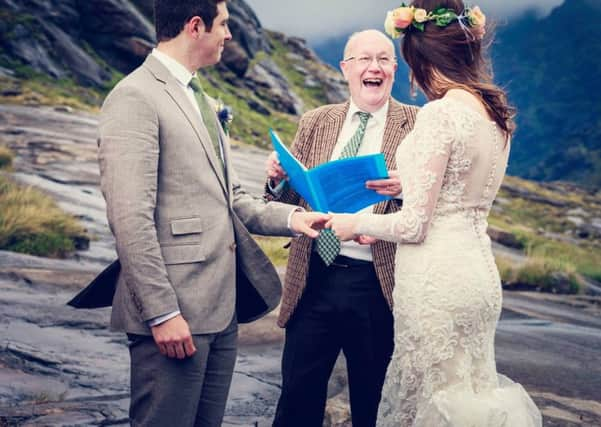Leaders: Humanists offer choice in a rapidly changing world


It is a phenomenal growth industry. The number of humanist weddings has increased nearly fifty-fold since they were first authorised in Scotland a decade ago.
There were 82 in 2005. Last year the figure had topped 4,000. That eclipses the traditionally dominant Church of Scotland after surpassing the Scottish Episcopal Church and Roman Catholic Church several years ago.
Advertisement
Hide AdAdvertisement
Hide AdHaving become more popular than ever north of the Border, humanist ceremonies now leave all the churches in their wake for the first time.
This says many things, but the key point is that society is increasingly secular, and when offered an alternative, many people are taking that option. And obviously, humanist celebrants are also doing something right, because people like what they offer.
Celebrants say people want their ceremonies to be more meaningful and relevant, and some couples can go on to be evangelical in promoting them to friends.
The rising trend could also have implications for other countries, since Scotland was one of the first in the world to permit humanist weddings.
However, the latest increase in popularity of the humanist ceremony should not be attributed to the introduction of gay marriage last year, since they account for only an estimated 5 per cent of the total. Instead, what we are seeing is a cultural shift.
The Kirk and other religions may see humanist ceremonies as a threat. They shouldn’t, because the issues involved run deeper than one statistic.
Churches know they face a challenge to their status, and falling attendances and the merger of congregations are evidence of decline.
Marriage figures are only part of the story. This shift is a long-term trend as part of a bigger picture, and it was inevitable that Scotland’s main church would be overtaken on marriages at some point.
Advertisement
Hide AdAdvertisement
Hide AdChurches are well aware they operate in a more secular society. After all, more than half of all marriages are now civil ceremonies anyway. In these circumstances, it is inevitable there will be a drift away from the marriage ceremony that churches offer.
But if humanists did not provide an alternative, marriage itself might be in significant decline, which should be a genuine concern for mainstream religions.
The figures do not mean the established churches are no longer relevant to many people. Far from it. They simply mean society is changing. No particular type of ceremony is right or wrong – people will be drawn towards the type of ceremony that feels right for them.
2015 seems to have been a pivotal moment in what is a remarkable success story for humanist marriage ceremonies.
Churches should not view this as a competition, where there are winner or losers. Much better they acknowledge that their place in society has changed, and consider what they can do – if anything – to adapt to that.
Saving lives always the top priority
Figures obtained by the Scottish Liberal Democrats reveal one of the most critical parts of our health service is in crisis.
More than 4,000 of the most life-threatened patients had to wait more than 20 minutes to be treated by paramedics last year – more than double the eight-minute target for such cases.
Of course, there are many and considerable pressures on the NHS. There are also very hard decisions to be taken across a wide range of areas, such as what should be funded and what has to be cut, and which drugs to make available and which ones are too expensive.
Advertisement
Hide AdAdvertisement
Hide AdHowever, the front line, where every second counts, is no place to be anything other than fully resourced.
The Scottish Government says the average response time across the board is within its target, but of course that doesn’t tell the whole story.
Crucially, it masks what’s happening to those who need to be assessed, stabilised and treated the fastest. The figures showed that waiting times for the most serious emergencies nearly doubled since last year.
They also revealed that the number of patients facing long waits in Glasgow alone has nearly trebled and almost doubled in Edinburgh.
These are very concerning statistics. Ministers have pledged to train 1,000 new paramedics over the next five years, which is good news.
But that in itself is recognition there is a problem and we should never have reached this position in the first place.
We have to get this right. In many cases, there is no second chance.